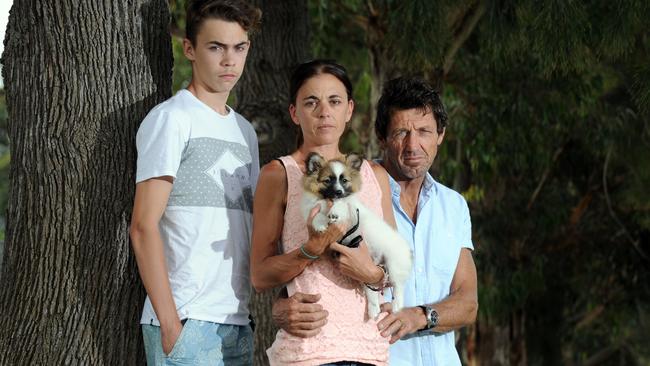Can We Talk campaign: Jessica Tolhurst’s life lost to depression and her family wants change
Jessica Tolhurst’s parents have spoken about the spiral of decline that saw a happy young child lose her battle against depression, an eating disorder and self-harm - compounded by bullying - at just 14.

NSW
Don't miss out on the headlines from NSW. Followed categories will be added to My News.
ONE day, caring and fun-loving teenager Jessica Tolhurst was smiling lovingly as she cuddled her new puppy Pepsi, an early Christmas present from her parents after a tough year.
The next, the 14-year-old who loved animals, drawing, skateboarding and mucking around with her brother Jack, took her own life.
Her mother Melinda Graham said: “I came home from picking up Jack from school and she was gone. She’d just gone. We don’t really know what happened.”

Jessica, who had been a “high-spirited” young girl until depression and anxiety set in when she was about 10 years old, committed suicide on December 7.
Her situation was made much worse by severe bullying at school.
“She was high-spirited, stubborn and determined,” Mrs Graham said. “She was just cheeky and gorgeous. Just your everyday gorgeous girl.
“She wanted to originally be a zookeeper. She just loved animals. She brought home any animals she could.
“She had such a caring nature. She was more worried about everyone else than she was herself.”
Jessica’s family has come forward to tell her story as part of The Sunday Telegraph’s Can We Talk? campaign in the hope of raising awareness about youth depression and the devastating affects bullying can have on vulnerable teens.
LISTEN TO OUR LATEST NEWS PODCAST
Mrs Graham said Jessica’s illness, which included an eating disorder, had started to improve until earlier this year when high school bullying reached a horrifying level.

In desperation, the family went to the police.
“We were getting there with her until the beginning of last year and once that stuff happened at school, it was just massive. With social media as well, they can’t escape,” she said.
“We had the police involved in the last month or so with a girl who threatened to kill me and to stomp on Jess’s head if she ever came back to school.”
Mrs Graham said that despite reporting the bullying and threats to police and to the school, those involved were never punished.
“The police came here and they rang the girl and did nothing else,” she said. “They didn’t talk to her parents, didn’t press any charges.
“I believe the schools need to do more. This girl should’ve been suspended or expelled from the school so that Jess felt safe to go back. A lot of things need to change.”

Mrs Graham and Jessica’s stepfather David are now looking at setting up the Bobdan Foundation (a reference to a bob cut-style haircut she once sported) in her memory to help educate teenagers and parents about depression and the affects of bullying.
“I don’t blame the kids. I think they need to learn from it and have consequences, but I don’t blame them,” Mrs Graham said.
“We really want to go to schools and help educate the kids. You have to be able to get inside their heads.”

Mrs Graham said her advice to other parents was to communicate with their children and look out for signs of suicidal tendencies.
“After approaching the eating disorder we found that as the control of eating was taken from Jess the self-harm issues skyrocketed. This is a key indicator that their head space is not right,” she said.
“Keep the communication happening and never think it’s not going to happen to you, that’s the biggest thing I can say.”
A spokesman for the NSW Department of Education said no allegation had been made to the department about a lack of action by the school in relation to the bullying.
“Any reported bullying is taken seriously and investigated by school authorities,” the spokesman said.


